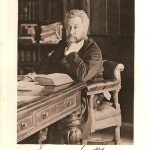 I believe nothing merely because Calvin taught it, but because I have found his teaching in the Word of God.
I believe nothing merely because Calvin taught it, but because I have found his teaching in the Word of God.
The doctrines of original sin, election, effectual calling, final perseverance, and all those great truths which are called Calvinism, though Calvin was not the author of them, but simply an able writer and preacher upon the subject are, I believe, the essential doctrines of the Gospel that is in Jesus Christ. Now, I do not ask you whether you believe all this – it is possible you may not; but I believe you will before you enter heaven. I am persuaded, that as God may have washed your hearts, he will wash your brains before you enter heaven.
I believe the man who is not willing to submit to the electing love and sovereign grace of God, has great reason to question whether he is a Christian at all, for the spirit that kicks against that is the spirit of the devil, and the spirit of the unhumbled, unrenewed heart.
But, say others, God elected them on the foresight of their faith. Now, God gives faith, therefore he could not have elected them on account of faith, which he foresaw. There shall be twenty beggars in the street, and I determine to give one of them a shilling; but will any one say that I determined to give that one a shilling, that I elected him to have the shilling, because I foresaw that he would have it? That would be talking nonsense. In like manner to say that God elected men because he foresaw they would have faith, which is salvation in the germ, would be too absurd for us to listen to for a moment.
Our Arminian antagonists always leave the fallen angels out of the question: for it is not convenient to them to recollect this ancient instance of Election. They call it unjust, that God should choose one man and not another. By what reasoning can this be unjust when they will admit that it was righteous enough in God to choose one race, the race of men, and leave another race, the race of angels, to be sunk into misery on account of sin.
Some, who know no better, harp upon the foreknowledge of our repentance and faith, and say that, Election is according to the foreknowledge of God; a very scriptural statement, but they make a very unscriptural interpretation of it. Advancing by slow degrees, they next assert that God foreknew the faith and the good works of his people. Undoubtedly true, since he foreknew everything; but then comes their groundless inference, namely, that therefore the Lord chose his people because he foreknew them to be believers. It is undoubtedly true that foreknown excellencies are not the causes of election, since I have shown you that the Lord foreknew all our sin: and surely if there were enough virtue in our faith and goodness to constrain him to choose us, there would have been enough demerit in our bad works to have constrained him to reject us; so that if you make foreknowledge to operate in one way, you must also take it in the other, and you will soon perceive that it could not have been from anything good or bad in us that we were chosen, but according to the purpose of his own will, as it is written, I will have mercy upon whom I will have mercy, and I will have compassion on whom I will have compassion.
Recollect also that God himself did not foresee that there would be any love to him in us arising out of ourselves, for there never has been any, and there never will be; he only foresaw that we should believe because he gave us faith, he foresaw that we should repent because his Spirit would work repentance in us, he foresaw that we should love, because he wrought that love within us; and is there anything in the foresight that he means to give us such things that can account for his giving us such things? The case is self-evident – his foresight of what he means to do cannot be his reason for doing it.
There was nothing more in Abraham than in any one of us why God should have selected him, for whatever good was in Abraham God put it there. Now, if God put it there, the motive for his putting it there could not be the fact of his putting it there.
A controversialist once said, If I thought God had a chosen people, I should not preach. That is the very reason why I do preach. What would make him inactive is the mainspring of my earnestness. If the Lord had not a people to be saved, I should have little to cheer me in the ministry.
I believe that God will save his own elect, and I also believe that, if I do not preach the gospel, the blood of men will be laid at my door.
Our Saviour has bidden us to preach the gospel to every creature; he has not said, Preach it only to the elect; and though that might seem to be the most logical thing for us to do, yet, since he has not been pleased to stamp the elect in their foreheads, or to put any distinctive mark upon them, it would be an impossible task for us to perform; whereas, when we preach the gospel to every creature, the gospel makes its own division, and Christ’s sheep hear his voice, and follow him.
God neither chose them nor called them because they were holy, but He called them that they might be holy, and holiness is the beauty produced by His workmanship in them.
Grace does not choose a man and leave him as he is.
